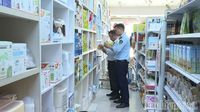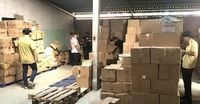On April 24, 2025, the People's Court of Da Nang City opened a trial concerning the production and trading of counterfeit goods, involving 13 defendants, including Nguyen Trung Luat, the director of Huy Truong Phat Printing Company. The case has raised significant concerns about the integrity of educational materials in Vietnam, particularly among parents and educators.
The trial follows a police operation on June 14, 2024, where law enforcement in Da Nang seized a substantial quantity of counterfeit textbooks. During the operation, officers apprehended Le Duy Quang and Le Minh Tri as they received 29 boxes containing 2,955 English textbooks from Nha Xuat Ban Giao Duc and Nha Xuat Ban Dai Hoc Su Pham TP.HCM. Further inspections revealed an additional 849 English books hidden within a nearby residence.
According to reports, Quang had purchased 3,388 textbooks from Pham Thach Kim Dien and another 416 from Tran Ngoc Tan, indicating a well-organized scheme to distribute counterfeit educational materials. In a separate incident on the same night, police also found Nguyen Van Anh in possession of 1,720 textbooks, all sourced from Kim Dien.
Nguyen Trung Luat, who heads the Huy Truong Phat Printing Company, along with Pham Ngoc Quang, allegedly resorted to producing fake textbooks due to financial difficulties faced by their businesses. From January 2024 to June 15, 2024, they are accused of producing a staggering 1,648,737 counterfeit textbooks, which were valued at over 51.1 billion VND. Additionally, they had 347,220 semi-finished products awaiting completion.
To facilitate the sale of these counterfeit books, Luat coordinated with Kim Dien, negotiating prices and discounts for the bulk orders. Kim Dien reportedly purchased a total of 251 orders, amounting to 1,176,744 counterfeit textbooks, which were then advertised and sold online.
As the trial unfolds, it highlights the broader issue of counterfeit goods in Vietnam, particularly in the education sector. The production and distribution of fake textbooks not only undermine the credibility of educational institutions but also pose risks to students' learning experiences.
In a separate development, on the same day, Mr. Nguyen Quang Huy, Deputy Head of the Market Management Sub-Department, Department of Industry and Trade of Ho Chi Minh City, addressed concerns regarding counterfeit milk products. During a press conference, he reassured the public that, as of now, no cases of fake milk production or sales have been detected in Ho Chi Minh City.
Huy noted that recent reports of hundreds of counterfeit milk products circulating in the market had caused alarm, particularly among parents and health-conscious consumers. To counter this, the Market Management Sub-Department has ramped up its surveillance and inspection efforts.
"As of now, our teams have not found any signs of fake milk production or sales in Ho Chi Minh City, unlike some other localities," Huy stated, affirming the department's commitment to ensuring food safety.
In 2024 and the first quarter of 2025, the Market Management Sub-Department conducted inspections that led to the handling of 590 food-related violations. They temporarily seized over 332,657 food products lacking proper documentation, with a total value exceeding 12.1 billion VND, and imposed fines amounting to over 11.2 billion VND.
In terms of dairy products specifically, the department inspected seven cases, seizing 2,654 boxes of various types of milk and 40 kilograms of milk powder, valued at over 188 million VND. They imposed fines of over 165 million VND and destroyed all violating goods.
Notably, Team No. 3 of the Market Management Department uncovered nearly 50 tons of frozen animal organs of unknown origin in Thu Duc City, valued at nearly 4.5 billion VND, leading to a fine of 315 million VND and the destruction of all violating goods.
Other significant findings included nearly 7 tons of smuggled refined sugar in Cu Chi district, 18,200 bottles of smuggled beer in District 12, and 1 ton of dried beef of unknown origin. These operations underscore the ongoing battle against counterfeit and substandard products in the market.
As authorities continue to crack down on counterfeit goods, both in educational materials and food products, the public remains vigilant. The implications of these operations extend beyond immediate financial losses; they touch on consumer trust, public health, and the integrity of the education system.
With the rise of e-commerce and online sales, the challenge of monitoring and regulating counterfeit products has become increasingly complex. The collaboration between law enforcement and market management teams is crucial in addressing these issues effectively.
As the situation develops, the outcomes of the trials and inspections will play a significant role in shaping future policies concerning counterfeit goods and consumer protection in Vietnam.





